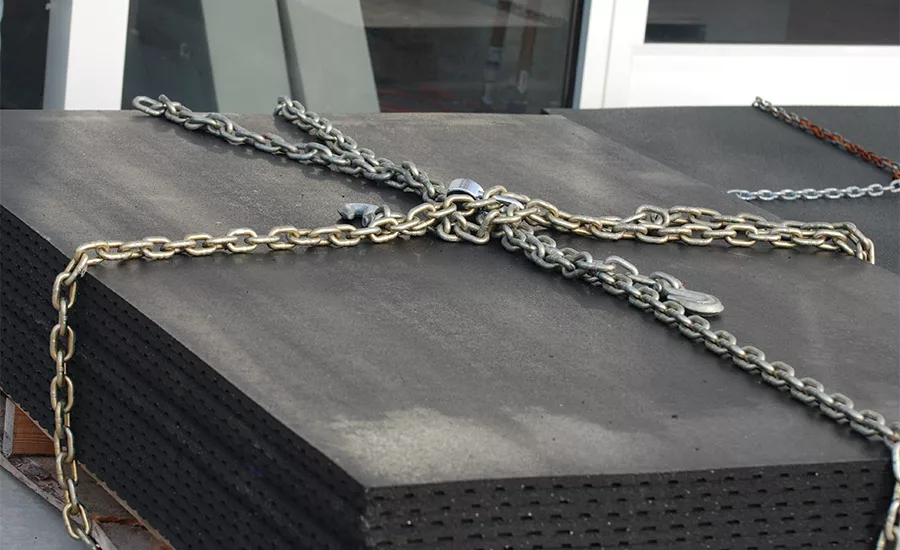How Can Drilling Contractors Spot Employee Theft?

This previous owner of this log home built it with money siphoned from a trusting employer. Past the home in the distance is land owned by a hunting club that lost all its money in a check fraud scheme.
Source: David King photos

A pile of stall mats outside a local tractor supply store. Hefty chains and padlocks can secure inventory, but they won’t guard against a thief on the payroll.
On June 2, 1975, at 5:45 a.m., I walked through the door at Star Iron Works in Punxsutawney, Pennsylvania, setting me on a path I had never considered. My father-in-law, Bob Means, asked me if I would take over management at one of his companies, as the current manager would be ready to retire in a couple years. After much thought, I decided to help.
In late 1979 or early 1980, I became president — but not because the current manager retired. Evidently, one way to advance in business is to catch your boss stealing from the company. I had never expected or suspected it. Everyone considered the manager the ultimate company man. My father-in-law thought highly of him.
Going through files to look up the price of items we had sold a few weeks earlier, I found the invoice and noted that it was for 10 pieces. The problem? We made 12. I loaded 12 on the manager’s truck to deliver. I confirmed with my customer that they had received just 10. A light went on in my brain.
The game was afoot. I watched and saw more product disappear. Over the next three months, I noted $60,000 in product vanishing in the same manner. I set up a meeting with my father-in-law and his finance guy. The meeting started with my statement that this manager “was stealing us blind.” Jaws hit the table. We hired a detective and found more proof. This is how I became president.
Over the years, this person likely stole hundreds of thousands of dollars in inventory. The manager took the products and delivered them to the owner of a local shop. Once sold, the money was split between the two crooks. No one knew how long it had gone on.
A Common Problem
Every business owner has either experienced employee theft or knows someone who has been a victim. We all know shops where, if an employee needed a new wrench we joke about buying 40 of them so we could give everyone a wrench to take home. That way, no one will need to steal the “company wrench.” I am not talking about this type of theft.
Employees who handle money can syphon funds. Perhaps, when they start, they think they will pay the money back. When they can’t and they don’t get caught, it can become a trend. Across the valley from my house is a nice log house built several years ago with stolen money. The victim was a beer distributor. He noticed how profitability increased when his assistant went on maternity leave, and how it shrunk when she came back.
In another case I heard about, a local manufacturer suffered when their parts manager was in cahoots with a bearing supplier. Purchase orders were made, packing slips provided and invoices paid. It went on great until an inventory when that parts manager was away showed lots of empty bearing boxes on the stockroom shelves.
I know of a local hunting club that lost all of its money to a bill payer of their organization. They had a two-signature policy for checks: A board member and this payer had to sign all the checks. Problems arose when the board member thought it more convenient if he just signed a bunch of checks in advance. Money gone.
In most cases like these, money is not recoverable. In many cases, the company just fires the thief and they go on to work at another company.
Many water well contractors are family owned businesses and money is handled by family members. That can solve the problem, but not always. All companies should take measures to head off employee theft. Of course, that’s easier with one thief, but more complicated when there are accomplices.
Beyond Embezzlement
Stealing money or items is not the only theft. I ran across this situation more than once: A salaried salesman for XYZ Bit Supply funnels sales leads to a rig manufacturer for a kickback. I doubt his employer expects him to solicit rig business on XYZ Bit Supply’s company dime. I even found a case where a salesman doing this had accounts with competitors and sold their products on the sly.
With Kingsland Drill, I had a salaried factory rep from a major top percussion manufacturer offer to set me up with mines for a commission. I said, “no thanks.”
When we started Kingsland Drill, our accountant stole $80,000 from us. We trusted him. By the time we knew, others had already caught him and there was no money left to make us whole. He took care of our payroll and taxes. What if we had searched our records and found he had shorted Uncle Sam? Scary.
We tend to worry more about scammers on the internet or thieves that might break in our buildings than the people we see every day who do our payroll. What are the signs? In my case, the manager was diligent in tracking sales and was constantly worried about profitability. We thought it was because he was a good “company man.” It turned out he was figuring out how much he could steal without sending signals.
Guarding Your Own Business
How do we protect ourselves? I am not a security expert and can only relay thoughts based on my experience. Consultants can review your processes. Some business groups offer guidelines. There is also good information online. When I learn of an employee theft incident, I think, “Could that happen here? Would I have caught that?”
How well do we really know our employees? I was lucky to be in a small town where everyone knew everyone. I would rely on current employees for recommendations. We had father/son duos. We knew our employees. If you don’t have that luxury, be wary of references. Former employers are careful not to say anything that might bring a lawsuit.
Look hard at employees involved in the financial end of your business. Our buyer, receiving and invoice payer were usually different people. We were large enough to do this. A lot of contractors are not. This sounds simple, but with modern computers and printers, would-be thieves can easily mimic packing lists. I approved all invoices. I suggest you do, as well, and also maintain and verify your inventory.
I think business owners have an unconscious feeling about the amount of profit they should see in their business. If yours falls short, trust your gut and investigate. Be aware of sudden changes in profitability. A few issues ago, columnist Wayne Nash wrote about knowing your drilling costs. (“How Do You Set Your Prices?” July 2019 National Driller, page 26.) Knowing your costs also will help you find possible theft. When in doubt, hire a security consultant. Secure your buildings, computers and procedures.
If you think you have found a thief, use caution in conducting an investigation or making accusations. A mistaken accusation could get you sued. This is why companies often just fire a suspect, and do not prosecute. But that only pushes the problem to someone else. Before you take legal action, get professional help to plan the best way forward. Consult your attorney and hire a professional to investigate. In my situation, we hired a detective. We got our proof and we pressed charges. They confessed and we did get some restitution.
Sometimes it is as obvious as this quote I read: “The more lax your security, the more likely you will be a victim.” Leaving your door open raises your odds of getting robbed. Let’s try to keep the door locked.
Looking for a reprint of this article?
From high-res PDFs to custom plaques, order your copy today!



